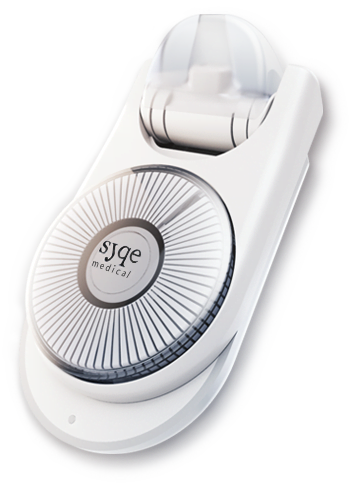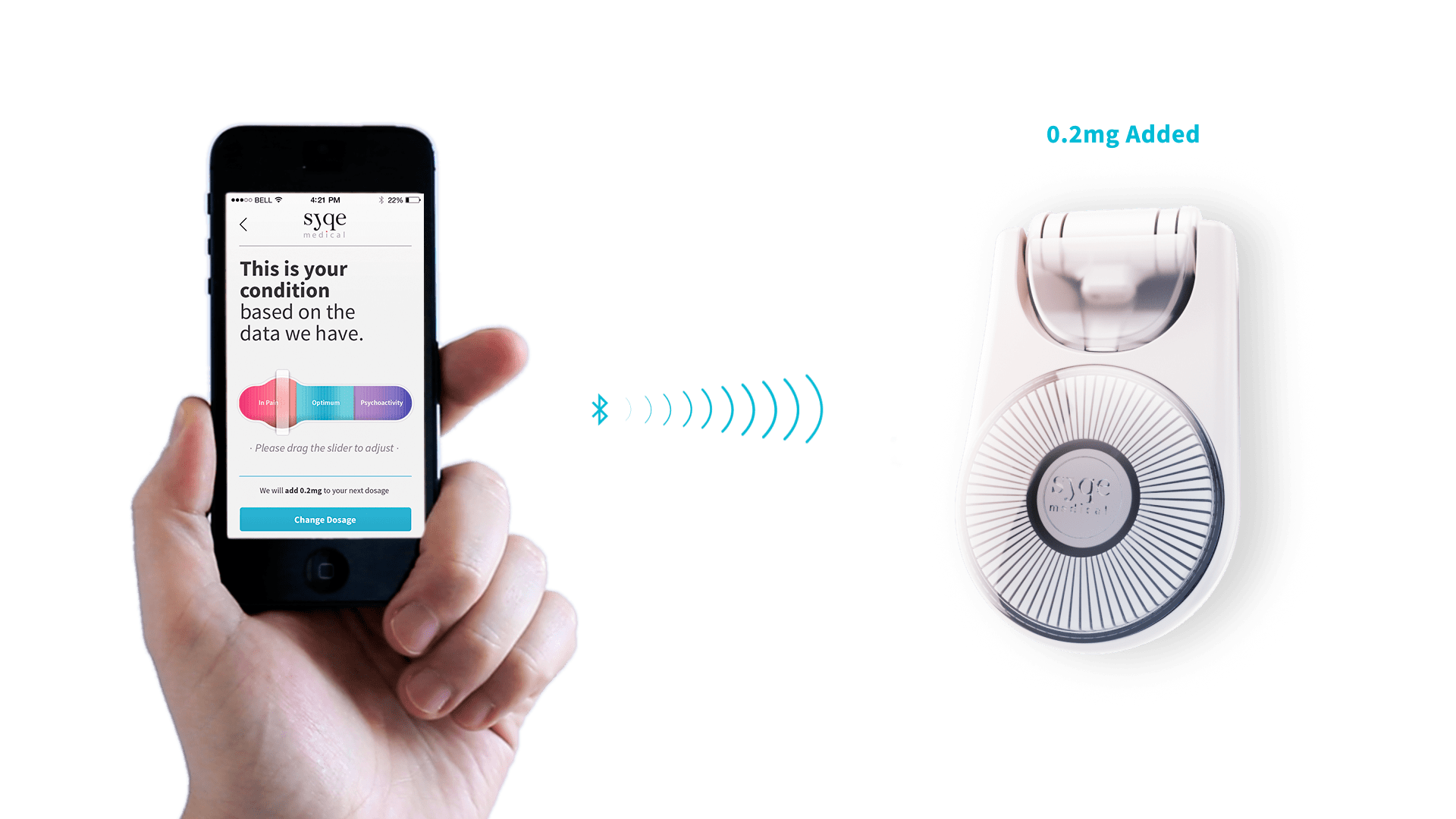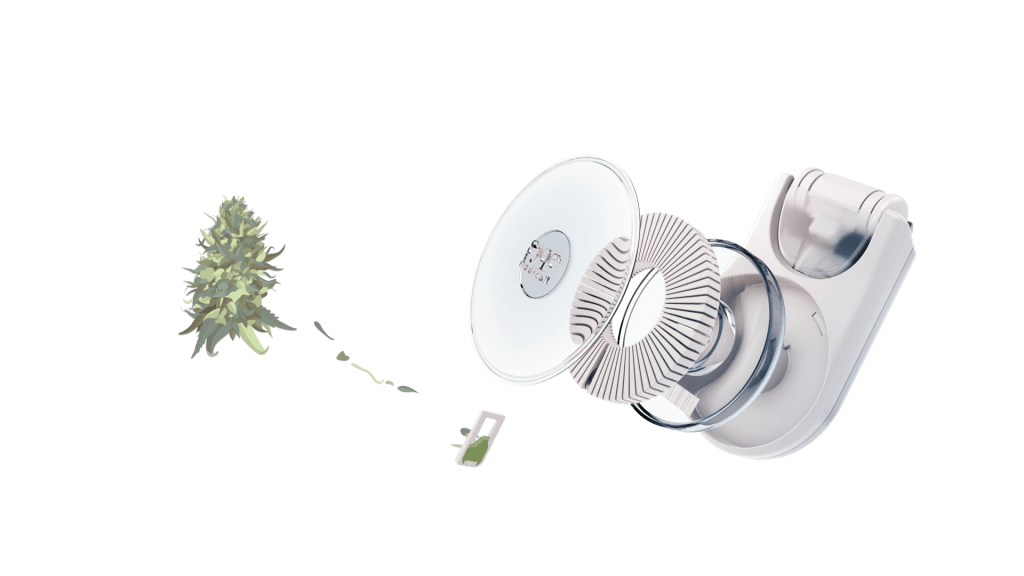If you ask Syqe Medical – creator of the world’s first 3D-printed hand-held cannabis inhaler – doctors prescribing joints for medical marijuana patients is old news. Until now patients had to make do with smoking or ingesting the sticky green stuff, which often leads to inaccurate dosage and negative stigma, but Syqe, which vaporizes tiny granules of cannabis in doses as small as 1 milligram, is aiming to give doctors and patients more control over treatment.
The company, founded in Israel, has created a novel method for extracting the pain-relieving THC (tetrahydracannabinol) using filters that are pre-loaded with the cannabis granules. These cartridges are placed into the inhaler so that all patients need to do is breathe in to feel the relieving effects of marijuana, without having the mind-altering side effects that usually come with it.
 While many medical practitioners have come around to prescribing the treatment, including CNN’s resident doctor Sanjay Gupta, who recently admitted he had been wrong in advising against medical marijuana, the treatment is still not mainstream. The creators of Syqe believe the main explanation for this is a lack of methods to fine-tune dosage according to individual needs.
While many medical practitioners have come around to prescribing the treatment, including CNN’s resident doctor Sanjay Gupta, who recently admitted he had been wrong in advising against medical marijuana, the treatment is still not mainstream. The creators of Syqe believe the main explanation for this is a lack of methods to fine-tune dosage according to individual needs.
“We are directly manipulating the human psyche in a very precise manner,” said Syqe Medical founder and CEO Perry Davidson to the Wall Street Journal. “A physician could prescribe a custom-tailored, individualized treatment for that patient, and not have a hit or a miss, but a very close hit on the accurate dosing that the patient required.”
A 3D high
The palm-sized Syqe inhaler is the first of its kind not only for its exact method for extracting TCH, but also because it is the first 3D printed inhaler on the market. The creators of the Syqe inhaler decided to keep the assembly line local, selecting Stratasys 3D printers to create the majority of the initial prototypes and trial inhalers. Though it is unlikely that the product will remain 3D printed when it hits the market, the company seems to be doing all it can to keep medical marijuana treatment accessible and affordable for those who need it.
SEE ALSO: How Israel Became A Medical Marijuana Powerhouse
In clinical trials so far, Syqe already sees up to 74 percent dosage precision and 3.2 times more efficiency in treatment than regular medical marijuana. In a recent Phase 1a clinical trial in Israel on patients with neuropathic pain, the users saw up to 45 percent reduction in the pain intensity 20 minutes post inhalation. According to Syqe, the only adverse effect was lightheadedness that occurred 15-30 minutes post inhalation, a finding which reinforces the safety of the marijuana inhalation method. With notable success in the initial clinical trials, Syqe hopes to market the inhaler to hospitals and doctors by the end 2014, and issue a home-care version by 2015.
Sign up for our free weekly newsletter
SubscribeIs marijuana really like every other prescription drug?

The Syqe inhaler is also linked to a clinical database that serves doctors, researchers and healthcare entities who can check up on a patients progress and ensure that their dosage is at the optimum level – the happy medium between experiencing pain and the psychoactive effects of THC.
SEE ALSO: Professor Raphael Mechoulam, The Father Of Marijuana Research, Talks To NoCamels
 Davidson, who helped launch Israel’s first government-backed provider of medical cannabis several years ago, says the State of Israel is at the “forefront’ of medical marijuana. And if you believe the figures, the government would be right to bet its money on the medical marijuana sector. According to Arcview Market Research, the legal marijuana market in the United States is currently worth around $2.5 billion, a figure that is expected to grow in the coming years to reach nearly $10 billion.
Davidson, who helped launch Israel’s first government-backed provider of medical cannabis several years ago, says the State of Israel is at the “forefront’ of medical marijuana. And if you believe the figures, the government would be right to bet its money on the medical marijuana sector. According to Arcview Market Research, the legal marijuana market in the United States is currently worth around $2.5 billion, a figure that is expected to grow in the coming years to reach nearly $10 billion.
With such encouraging numbers, the startup has received over $1 million in support over the past three years from the Office of the Chief Scientist in Israel and the support of government agencies that are eager to see Israel shine in the field of medical marijuana research and development. Now Syqe is hoping to raise between $10 to $15 million from other investors to continue testing.
But, says Davidson, achieving the universal acceptance of medical marijuana by doctors and patients is still an uphill battle: “We see it as a challenge,” Davidson told the “Wall Street Journal”, “If we can unlock it…we believe that we can finally bring cannabis as a mainstream drug, and have physicians be comfortable using it.”
Photos: Courtesy
Related posts

Israeli Medical Technologies That Could Change The World

Harnessing Our Own Bodies For Side Effect-Free Weight Loss

Missing Protein Could Unlock Treatment For Aggressive Lung Cancer




Facebook comments